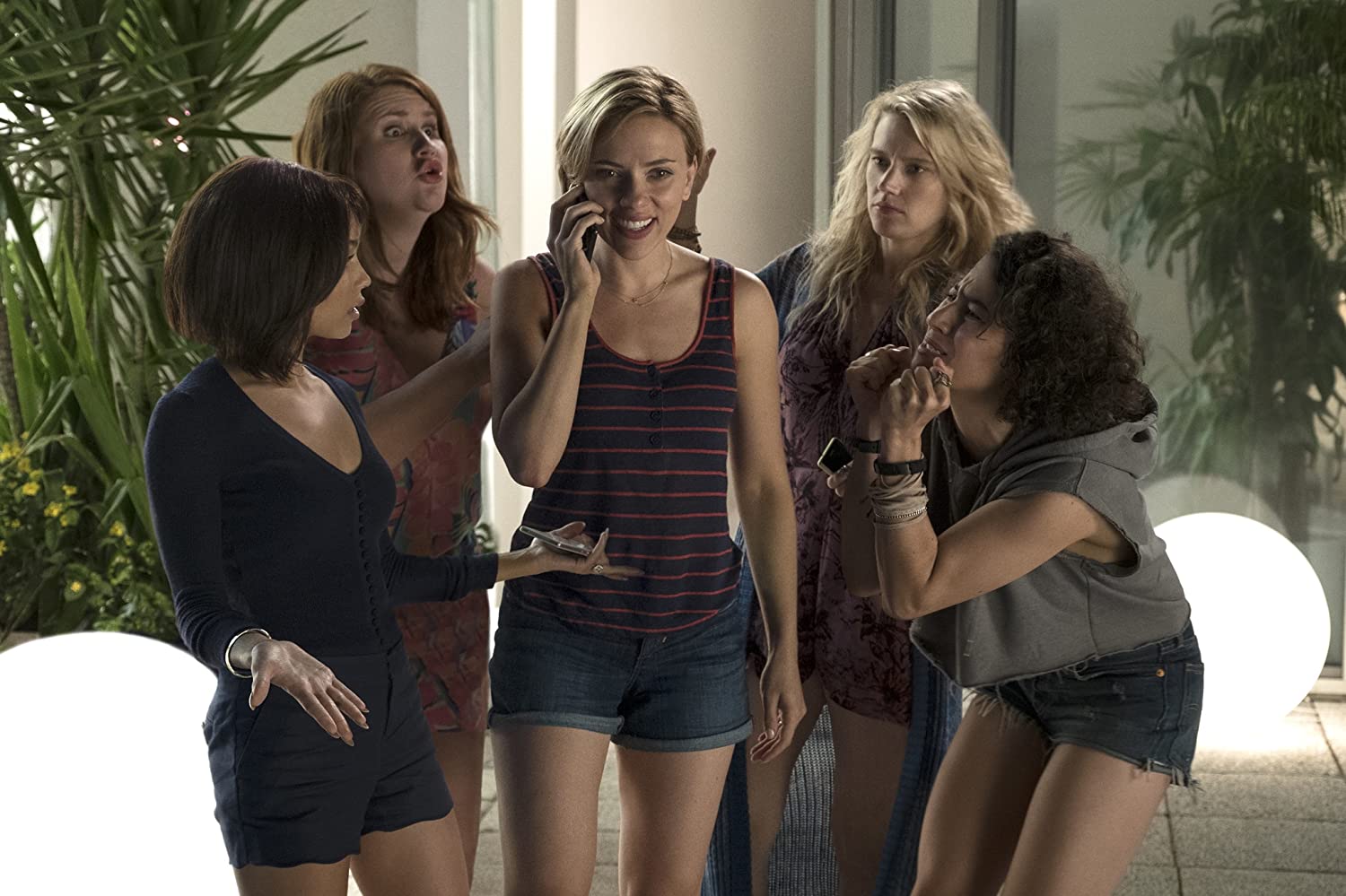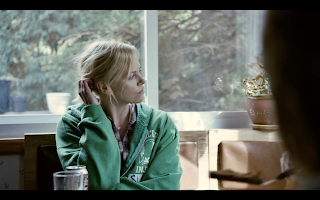Rough Night is a hot, as in sometimes good and funny, mess. Considered by
some to be another female-equivalent of The Hangover,
Rough Night fits the mold but doesn't break it. While The Hangover, and
Bridesmaids, wrote their characters as people first, Rough Night writes
them as stereotypical women first, and characters second. Sometimes it works
well, but often it doesn't.
In Rough Night, Jess's (Scarlet Johansson) bachelorette party is derailed because of the accidental death of the stripper that, of course, she did not ask for or want her friends to order. Because of the circumstances of his death, she and her friends Alice (Jillian Bell), Frankie (Ilana Glazer), Blair (Zoe Kravitz), and Pippa (Kate McKinnon) try to cover it up, and plot contrivances make the situation go from bad to worse.
Tonal shifts, personally, are rarely an issue when watching a movie, except this time. This death scene is one of the more jarring ones in a movie because it feels so disconnected from the rest of the film. It's played completely straight by the cast, but attempted humor is sprinkled in over screams and panic. The jokes are good, like one about a much-needed YouTube video on CPR being pre-empted by an ad, but everything else about the scene is saying, "if you laugh now, you're a bad person, and other people in this will look at you in disgust." What may have helped is if the director (Lucia Aniello) had the composer (Dominic Lewis) step in and leave a hint. One thing about the music, the soundtrack is less on the nose than Bad Moms.
As mentioned, the plot is lacking, and some things make no sense, like how Jess's fiancee is unable to contact Jess for part of the film. Does he really not have any of her friends' numbers? However, Rough Night tries to make these issues its strength, relies on its actors instead, and plays on the audience's expectations of new humor in the continuing R-rated comedy revolution. So, moments like a tame bachelor party, where Jess's fiance Peter (co-writer Paul W. Downs) is being consoled by his bros, work really well in the post-Apatow world. Downs, by the way, is one of the standouts on-screen.
The entire cast is great, after a rocky start, but only given so much to work with. McKinnon is a shining example of that. She must have trusted Aniello and Downs when they said, "do that thing you do, and we'll give Pippa something real the audience can hold onto." Pippa is almost exclusively comic-relief and is only as strong as McKinnon's crazy eyes and Australian accent. She's more than a plot device, and McKinnon is having a blast playing her, but that's because she owned the role.
Rough Night is a much-needed film, for the cast, for the genre, for its audience, but its success will only come from the similar movies that surpass it...I'm certain some of them will be better attempts from this group.
In Rough Night, Jess's (Scarlet Johansson) bachelorette party is derailed because of the accidental death of the stripper that, of course, she did not ask for or want her friends to order. Because of the circumstances of his death, she and her friends Alice (Jillian Bell), Frankie (Ilana Glazer), Blair (Zoe Kravitz), and Pippa (Kate McKinnon) try to cover it up, and plot contrivances make the situation go from bad to worse.
Tonal shifts, personally, are rarely an issue when watching a movie, except this time. This death scene is one of the more jarring ones in a movie because it feels so disconnected from the rest of the film. It's played completely straight by the cast, but attempted humor is sprinkled in over screams and panic. The jokes are good, like one about a much-needed YouTube video on CPR being pre-empted by an ad, but everything else about the scene is saying, "if you laugh now, you're a bad person, and other people in this will look at you in disgust." What may have helped is if the director (Lucia Aniello) had the composer (Dominic Lewis) step in and leave a hint. One thing about the music, the soundtrack is less on the nose than Bad Moms.
As mentioned, the plot is lacking, and some things make no sense, like how Jess's fiancee is unable to contact Jess for part of the film. Does he really not have any of her friends' numbers? However, Rough Night tries to make these issues its strength, relies on its actors instead, and plays on the audience's expectations of new humor in the continuing R-rated comedy revolution. So, moments like a tame bachelor party, where Jess's fiance Peter (co-writer Paul W. Downs) is being consoled by his bros, work really well in the post-Apatow world. Downs, by the way, is one of the standouts on-screen.
The entire cast is great, after a rocky start, but only given so much to work with. McKinnon is a shining example of that. She must have trusted Aniello and Downs when they said, "do that thing you do, and we'll give Pippa something real the audience can hold onto." Pippa is almost exclusively comic-relief and is only as strong as McKinnon's crazy eyes and Australian accent. She's more than a plot device, and McKinnon is having a blast playing her, but that's because she owned the role.
Rough Night is a much-needed film, for the cast, for the genre, for its audience, but its success will only come from the similar movies that surpass it...I'm certain some of them will be better attempts from this group.







 Just before the dark times of DreamWorks Animation, and animation in general,
during the mid-2000s, there was The Road to El Dorado, a film that is
only wounded by its Disney-isms but not destroyed because of them.
Just before the dark times of DreamWorks Animation, and animation in general,
during the mid-2000s, there was The Road to El Dorado, a film that is
only wounded by its Disney-isms but not destroyed because of them. 















